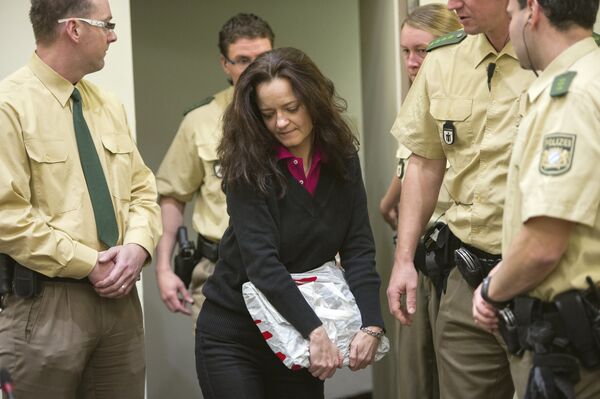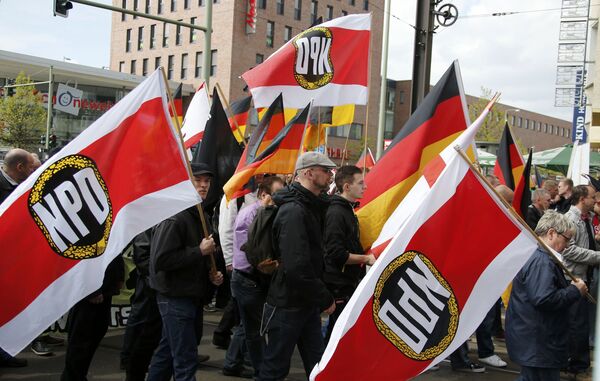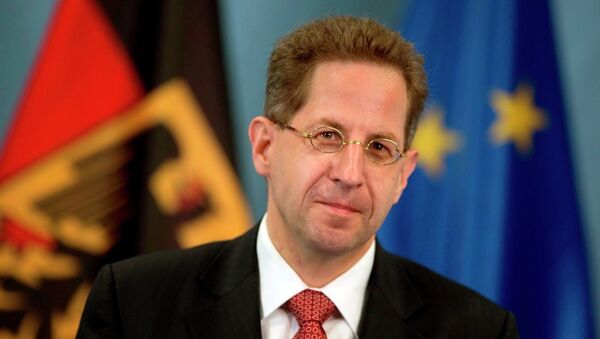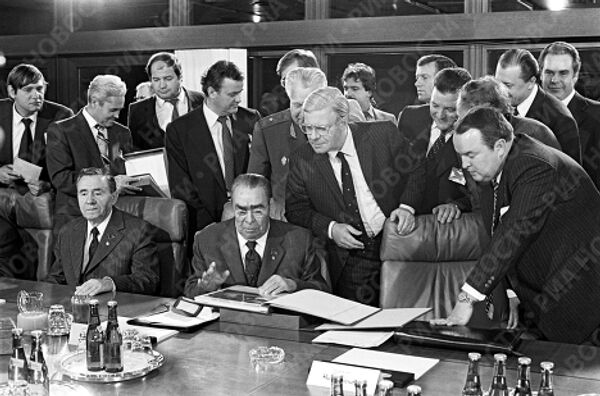Maassen made his incendiary comments in September, igniting countrywide outcry, spurring leading lawmakers to call for his resignation, on grounds of meddling in national politics, and exposing deep rifts in Germany's fragile and passionless ruling coalition. The Social Democrats, Merkel's junior coalition partners, have demanded Christian Social Union Interior Minister Horst Seehofer sack the agency chief, calls that have as yet gone unrequited — a meeting between the ruling parties to discuss his future has been set for September 18.
The government has declined to comment on national media reports indicating Merkel has already decided to oust Maassen — although whatever his fate, the controversy is but the latest to besmirch the BfV's reputation.
Guillame Affair
In 1956, Gunter Guillame and his wife, citizens of the German Democratic Republic, emigrated to the Federal Republic of Germany. Posing as dissidents fleeing Communism, Gunter was in fact a Stasi operative, sent to penetrate West Germany's political system.
The secret agent was devastatingly effective — he quickly ascended the ranks of the Social Democratic Party, becoming so trusted he was named one of then-FRG Chancellor Willy Brandt closest aides in the wake of the SPD's electoral landslide in 1969.
Gunter operated without detection for almost two decades, passing highly sensitive information directly to the Stasi. It would not be until 1973 authorities uncovered his covert activities — while Brandt was informed, they asked him to allow Gunter to continue working as usual until they built a concrete case. Brandt duly did so, even going on a subsequent holiday jaunt with the Stasi spy.
Gunter was eventually arrested April 1974. The resultant scandal was a major contributing factor to Brandt resigning the Chancellery the following month, adding to existing controversies over his serial adultery, and issues with alcoholism and depression.
After German reunification in 1990, Gunter was granted immunity from prosecution — he even served as a supportive witness in Wolf's trial for treason in 1993.
Double Agents Uberalles
Gunter was not alone — many Stasi agents penetrated the upper echelons of various spheres of West German society during the Cold War. However, the readiness of BfV employees to offer their services to the Stasi negated the need for the latter to infiltrate the former, with perhaps the most famous — and interconnected — examples being the cases of Klaus Kuron and Hans-Joachim Tiedge.
Klaus joined the BfV in 1962, and was promoted to the agency's counter-intelligence division within five years. In 1981, motivated by financial pressure, he contacted the Stasi directly via the East German embassy, receiving a one-off lump sum payment of 150,000 Deutschmarks and a monthly stipend of 4,000 Deutschmarks for providing information on West German informants and agents operating in the GDR.
In August 1985, Hans-Joachim, the BfV's head of counter-intelligence, fled to the GDR — again motivated by financial concerns. It was the most damaging defection of the Cold War for the FRG — agents had to be rapidly pulled out of East Germany, and the credibility of the BfV was severely damaged, resulting in the resignation of several top agency officials.
For one, it was revealed Hans-Joachim had been secretly working for the Stasi for several years prior to his departure, using his position to hamper and prevent the detection and capture of East German spies operating in the FRG. Question marks also abounded over how the double agent had remained in the service so long, and been promoted to the top of an extremely important division, despite sizeable debts, familial issues and a serious drinking problem.
Moreover, the defection also allowed the Stasi to claim information provided by Kuron had actually been passed to them by Hans-Joachim — allowing the former to continue operating undetected until the end of the Cold War. Kuron turned himself into authorities post-reunification, and was sentenced to 12 years in prison for his activities.
An Infiltration Too Far?
Between September 2000 and April 2007, the National Socialist Underground (NSU) — a neo-Nazi group comprised of just three individuals — wreaked intermittent havoc across Germany, robbing at least 14 banks, carrying out a number of bombings, murdering at least 10 people and injuring potentially scores more.
The group's assassination targets were almost all small business owners, including doner kebab vendors and greengrocers, of Turkish descent — a Greek shopkeeper was also murdered, along with a German police officer. Despite the attacks having clear connections — the victims were all murdered in broad daylight with a gunshot to the face at close-range, fired from a rare Ceska 83 pistol — the trio evaded arrest for almost a decade due to an apparent refusal by law enforcement to accept a racial motive behind the killings.

Moreover, a fully-fledged BfV agent, Andreas Temme, was present at the slaying of Halit Yozgat, an internet café owner in the central city of Kassel, by NSU members in April 2006. He initially told investigators he left the premises shortly before the killing, but after a number of witnesses placed him directly at the scene of the crime, he changed his statement. Despite being arrested for complicity in the murder, and being fired from his BfV job, Temme's role in the incident has never been conclusively determined or publicly investigated as of September 2018.
‘Lack of Clarity'
Prior BfV infiltration of right-wing entities in Germany was decidedly less murderous, but no less ignominious and awkward for the spy agency. In January 2001, the federal government, Bundestag, and Bundesrat all asked the Federal Constitutional Court to determine whether the National Democrats, was unconstitutional, in an attempt to ban the party outright.
An investigation of the party was launched by officials — but the joint petition was eventually rejected in 2003, after it was determined a vast number of NPD members and grandees — including at least 30 of its leading figures — were undercover agents or informants of the BfV.

As a result, the court ruled it was impossible to ascertain which statements, publications and actions attributed to the party were partially or wholly directed and/or influenced by the BfV — a task made all the more difficult by the agency refusing to fully disclose operatives' identities and activities — and even suggested the party's more incendiary activities were deliberately directed in an attempt to ban the party.





